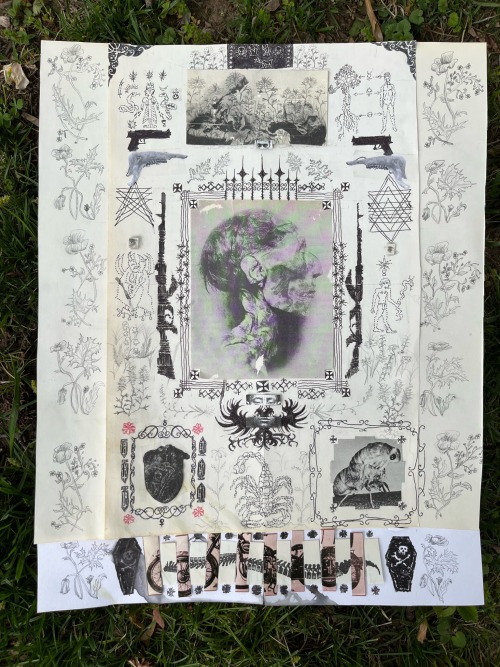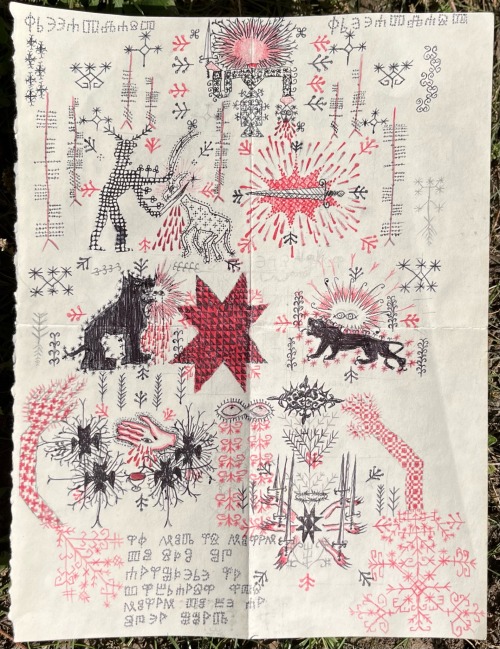Sigilheart

More Posts from Sigilheart and Others

Figure of hand from Compendium rarissimum totius Artis Magicae sistematisatae per celeberrimos Artis hujus Magistros ~1775


circa this past spring during my esoteric jihad / yukio mishima phase.

The proposed integrative model of existential threat experiences
Daniel Sullivan, Cultural-existential Psychology: The Role of Culture in Suffering and Threat
The basic tenets of alchemy:
1. The universe has a divine origin. The cosmos is an emanation of One God. Therefore All is One.
2. Everything in the physical world exists by virtue of the Law of Polarity or Duality. Any idea can be defined in relation to its opposite, such as: male-female, light-dark, sun-moon, spirit-body, and so on.
3. Everything in the physical world is composed of Spirit, Soul, and Body: the Three Alchemic Principles. (In alchemy, these are called Mercury, Sulfur, and Salt.)
4. All alchemical work, whether practical laboratory work or spiritual alchemy, consists of three basic evolutionary processes: separation, purification, and recombination.
5. All matter is composed of four archetypal energies—the four elements of Fire (thermal energy), Water (liquid), Air (gas), and Earth (solid). The knowledge and skillful use of these four energy types is an essential part of alchemical work.
6. The Quintessence, or “Fifth essence,” is contained within the four elements but is not one of them. It is one of the three essential Principles, also called the Philosophic Mercury.
7. Everything moves toward its preordained state of perfection.
Israel Regardie, The Philosopher’s Stone: Spiritual Alchemy, Psychology, and Ritual Magic

When we sleep our astral body separates from the etheric body, only connected with the silver cord. When we wake again the two bodies connects again and in that short time before they are joined fully, the dreams are transferred from the astral body to volatile memory in the etherbody.
When the two bodies are rightly joined we have no spiritual access to the astral world, but for some people the two bodies don’t join fully, there is a rift between them which can be used by natural clairvoyants or there can be created a rift through drugs or other means.
Love – Initiation – The Dark Night of the Soul


Hegel’s Dialectics
Dialectics drives to the “Absolute”,… which is the last, final, and completely all-encompassing or unconditioned concept or form in the relevant subject matter under discussion (logic, phenomenology, ethics/politics and so on). The “Absolute” concept or form is unconditioned because its definition or determination contains all the other concepts or forms that were developed earlier in the dialectical process for that subject matter…We can picture the Absolute Idea, for instance—which is the “Absolute” for logic—as an oval that is filled up with and surrounds numerous, embedded rings of smaller ovals and circles, which represent all of the earlier and less universal determinations from the logical development. [Fig. 1].
Since the “Absolute” concepts for each subject matter lead into one another, when they are taken together, they constitute Hegel’s entire philosophical system, which, as Hegel says, “presents itself therefore as a circle of circles”. We can picture the entire system like this [Fig. 2].

Dialectics: Being-Nothing-Becoming
When we think Being it immediately is Nothing, and Nothing is immediately Being. The very thinking of them is their vanishing, and thinking is what a thought truly is. It is no logical nonsense to say the truth we have experienced: Being is Being vanishing to Nothing, and vice versa.

The Qabalah describes the universe as divided into four separate “Worlds”. The first is Atziluth, the Archetypal World, the world of Pure Spirit which activates all of the other worlds which evolve from it. The second world is Briah, the Creative World, the level of pure intellect. The third is Yetzirah, called the Formative World because here are found the subtle and fleeting patterns behind matter. The final World is Assiah, the active world containing both the physical world of sensation and the unseen energies of matter.
Robert Wang, The Qabalistic Tarot: A Textbook of Mystical Philosophy
-
 sigilheart reblogged this · 2 months ago
sigilheart reblogged this · 2 months ago -
 killerresource reblogged this · 8 months ago
killerresource reblogged this · 8 months ago -
 xwitches-gardenx reblogged this · 9 months ago
xwitches-gardenx reblogged this · 9 months ago -
 demi-vierge liked this · 1 year ago
demi-vierge liked this · 1 year ago -
 billieandthecraft reblogged this · 2 years ago
billieandthecraft reblogged this · 2 years ago -
 ifabusiayo liked this · 2 years ago
ifabusiayo liked this · 2 years ago -
 in-consist liked this · 2 years ago
in-consist liked this · 2 years ago -
 sailorbongwater liked this · 2 years ago
sailorbongwater liked this · 2 years ago -
 deegausserr reblogged this · 2 years ago
deegausserr reblogged this · 2 years ago -
 gloomygalavant liked this · 2 years ago
gloomygalavant liked this · 2 years ago -
 teratocore reblogged this · 2 years ago
teratocore reblogged this · 2 years ago -
 farmwitch liked this · 2 years ago
farmwitch liked this · 2 years ago -
 teratocore liked this · 2 years ago
teratocore liked this · 2 years ago -
 imsh liked this · 2 years ago
imsh liked this · 2 years ago -
 ohmy-whatshallido liked this · 2 years ago
ohmy-whatshallido liked this · 2 years ago -
 ame-poet liked this · 2 years ago
ame-poet liked this · 2 years ago -
 sisterofreverance liked this · 2 years ago
sisterofreverance liked this · 2 years ago -
 oldonesorceress liked this · 2 years ago
oldonesorceress liked this · 2 years ago -
 jearbear6 liked this · 2 years ago
jearbear6 liked this · 2 years ago -
 dragontantra777 reblogged this · 2 years ago
dragontantra777 reblogged this · 2 years ago -
 dragontantra777 liked this · 2 years ago
dragontantra777 liked this · 2 years ago -
 vallis liked this · 2 years ago
vallis liked this · 2 years ago -
 001latte liked this · 2 years ago
001latte liked this · 2 years ago -
 kaminoocha liked this · 2 years ago
kaminoocha liked this · 2 years ago -
 fhuhggyhbvfyy liked this · 2 years ago
fhuhggyhbvfyy liked this · 2 years ago -
 alexsensation23 reblogged this · 2 years ago
alexsensation23 reblogged this · 2 years ago -
 midnightflowx reblogged this · 2 years ago
midnightflowx reblogged this · 2 years ago -
 midnightflowx liked this · 2 years ago
midnightflowx liked this · 2 years ago -
 raspberryrose-shakti reblogged this · 2 years ago
raspberryrose-shakti reblogged this · 2 years ago -
 sansilogy liked this · 2 years ago
sansilogy liked this · 2 years ago -
 berlinbambi liked this · 2 years ago
berlinbambi liked this · 2 years ago -
 cherryredmistakes reblogged this · 2 years ago
cherryredmistakes reblogged this · 2 years ago -
 cherryredmistakes liked this · 2 years ago
cherryredmistakes liked this · 2 years ago -
 alifestyleforalifetime liked this · 2 years ago
alifestyleforalifetime liked this · 2 years ago -
 le-ange-de-amour reblogged this · 2 years ago
le-ange-de-amour reblogged this · 2 years ago -
 internetspiders reblogged this · 2 years ago
internetspiders reblogged this · 2 years ago -
 w1ldw0rld2 liked this · 2 years ago
w1ldw0rld2 liked this · 2 years ago -
 ashtrayheart9 reblogged this · 2 years ago
ashtrayheart9 reblogged this · 2 years ago -
 ashtrayheart9 liked this · 2 years ago
ashtrayheart9 liked this · 2 years ago -
 heavymetalgirlfriend reblogged this · 2 years ago
heavymetalgirlfriend reblogged this · 2 years ago



